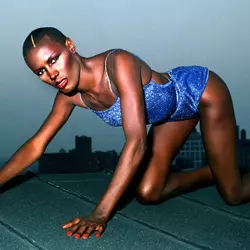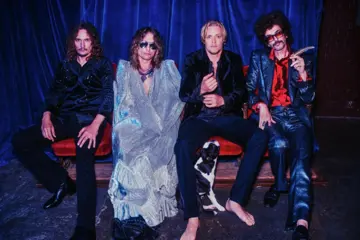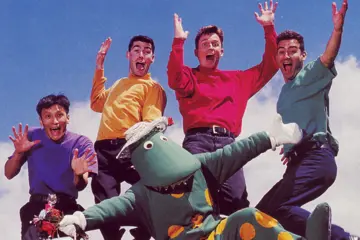 Grace Jones
Grace Jones"It's funny how, on the red carpet, people would say to Grace, [puts on insipid voice] 'What do you want to say to young girls?' and she'd say, '[adopts impressive Grace Jones impression] Well, I hope I've got something to say to young men, too'," Sophie Fiennes, director of Grace Jones: Bloodlight & Bami, chuckles. And Fiennes is delighted to learn that her Grace Jones documentary premieres in this country on International Women's Day: "Oh, is it? Oh, good."
If you were fortunate enough to catch one of Grace Jones's recent Australian shows, you would undoubtedly have left in awe of everything about this extraordinary performer including her knack for sustained hula hoop spinning throughout Slave To The Rhythm's duration, during which she even chose to introduce her band members, one by one. "She taught me how to hula-hoop!" Fiennes extols. "What have I learnt from Grace Jones? Well, I've actually learnt how to hula-hoop! I never thought I would be able to just hula-hoop for hours on end, but she just taught me the trick of it, how you do it," she laughs. We then ask whether Fiennes can reveal "the trick", but she continues, "But the one thing I can't do is wear high heels for hours on end. I dunno how she does that!"
"I've been around the block too many times - around the globe is more like it, fuck the block!" - Grace Jones
In Jones' autobiography, I'll Never Write My Memoirs, the star recounts her experience directing the video for I'm Not Perfect (But I'm Perfect For You) herself. Did you know this song sprang from a conversation Jones had with Mick Jagger? After the pair discussed the challenges of being in a relationship when you're famous, they riffed and came up with the line that became the song's title and chorus. Jones then took this line away, completed the song, which Jagger never asked to be credited for. Because this song was intensely personal, Jones wished to direct the accompanying music video herself since she'd gleaned plenty of knowledge from her partner and visual collaborator Jean-Paul Goude.
"I had to be a bitch to maintain any kind of authority," Jones writes in her memoir. "Well, if I were a man, I wouldn't have been considered a bitch. If I were a man, I would simply have been in charge, however aggressive and demanding I was. I wouldn't have had other people running about filming things behind my back. A man putting his foot down is in control. It's strong. A woman putting her foot down is out of control. She's weak." Production and editing times were chopped and therefore Jones was left feeling like she "was never really given a chance" to realise her vision, we learn. "I was not being a prima donna: I was just trying to concentrate on a technically difficult task while I was being talked to like I was a silly pop singer who'd gotten carried away with her own ego."
Don't miss a beat with our FREE daily newsletter
In I'll Never Write My Memoirs, Jones also writes: "You can tell why there are so few female film directors. It's the same with any job that society has decided can only be done by a man. They find ways to undermine and undervalue a woman doing that job. And the fact that you end up saying 'they' makes you sound paranoid."
It's fitting, then, that Jones got in touch with Fiennes to take the reins for Grace Jones: Bloodlight & Bami, having first met the director when she was filming Hoover Street Revival, which features Jones' brother, Bishop Noel, and his Pentecostal church. "Her brother who's a Pentecostal Bishop, he's an extraordinary performer as well," Fiennes points out. "I think it's a Jamaican thing, you know, the Jamaican language is very rich in its sense of invention of words and rhythm and language. I mean, [Grace Jones's] sense of language is brilliant!"
After meeting through Hoover Street Revival, Fiennes explains she "sort of kept in contact, a little bit" with Grace. "And then she called me and she said, 'Look… someone approached me again to make a documentary and I just don't want to do what they want to do - it's just not me - and so why don't we do something together?'
"When she said that, I was like - you know, I hadn't even imagined that was gonna be possible! So I thought, 'Wow, that's amazing!' She said, 'I'll just tell you when we're recording in a studio,' and we started talking. We just started from there and it just grew. And I just kept shooting and decided that I wouldn't kind of embark on it from a position of saying, 'Well, what should a Grace Jones film be?' I would just shoot and just be open to Grace herself, and just keep kind of gathering until I got to a point where I thought, 'I've got material here that has range enough that I think there's a film there'. But I really needed her performance, because... when she first did a set with her band, it was just so exciting and I just knew that I had to raise the finance and, you know, had this idea to kind of think about the documentary more like a musical where the songs would shape the narrative."
Throughout Bloodlight & Bami, footage often directly relates to the song that follows. For instance, Jones discussing her ancestry around a table while visiting her family in Jamaica segues into a performance of her autobiographical track, Williams' Blood.
Within this song's lyrical content, there's a sense that Jones feels pressure from her paternal bloodline - "Why don't you be a Jones like your sister and your brother Noel?/When are you gonna be a Jones your just like your Dad?" - while the Williams' blood courses feverishly through her veins. On this particular song, Fiennes opines, "I think, apart from anything, there's a whole line of ideas in there around patriarchy... 'Cause she says, 'I've got the Williams' blood in me,' but then she's so much a Jones, you know, in the sense of what the mother says, you know, 'The Jones' are always told the Jones' always come first, they never come second; they always come first'. So there's a sense of, you know, she's got that power of being a Jones and then the Williams, and then she's [her step-grandfather] Mas P and then there's just a thousand moments where she's constantly repositioning who she is.
"But what I find powerful in that sense of the patriarchy, is that actually the father gave her the land, the Jones land; in a sense she's a bit like a sort of Brynhildr in that she's the powerful daughter who takes up the patriarchal sword, but it's in the hands of a woman - the land at the end [of Bloodlight And Bami], which is the Jones family land where she's gonna build a house, where the house had blown down, you know. There's something very powerful in that, to me: that she has overcome the kind of male domination by impersonating the men, but so much as a woman, you know? That's kind of brilliant to me."
After her parents emigrated to Syracuse, New York, Jones and her siblings remained in Jamaica where they were raised by their grandmother and step-grandfather Master Patrick (Mas P). We're told during this documentary that the children were forced to read passages from the bible while Mas P beat them with a variety of straps and canes, all of which he named. There's a chilling scene in Bloodlight And Bami where Jones admits she had an epiphany during a drama class, realising that the reason she can be "so scary" during a performance is because she adopts Mas P's mannerisms.
Fiennes admits that she was "amazed" when Jones shared this information. "I didn't know anything of that when I was filming that. It completely astonished me and then I kind of - I don't know whether you make that connection in the film, but I suddenly thought that, you know, the Russell Harty moment [when Jones lashed out at the British television reporter]; the fact that how she experienced it was him saying, 'YOU, shut up! YOU, be quiet,' and that he suddenly kinda like triggered that rebellious child in her, because he somehow assumed this position of authority and patronised her and dismissed her. And, you know, suddenly it shed light on that as well, because I think for all the audience: they knew that something very real had erupted in that moment with Russell Harty; something that no one really understood, but it really shaped the sense of who she was."
Fiennes recalls another part of I'll Never Write My Memoirs where Jones writes about "the hedonism, also a kind of extreme partying that she's famous for from the disco-era days". "She talks in her memoir about, you know, you went out to lose yourself to find yourself." There's some wonderful dialogue in the film featuring Jones in conversation with a Parisian taxi driver, expressing her extreme disappointment that fewer people seem to go out partying for days on end. Fiennes shows off her Jones impersonation skills once more when referencing this scene. "'What's wrong? People should still be partying'," she mimics. "And then when she said to the DJ, 'I'll keep you up all night!'It is that kind of vampire side of Grace, which is awake at night, asleep in the day."
"11.30 in New York and people are leaving the party. Honey, they must be depressed. This is fucking New York City we're talkin' about!" - Grace Jones
Fiennes continues: "Also I loved what she said about, 'Timothy Leary can hold my hand when I'm dying' [laughs]. Such an amazing thought! You know, 'I would like to die holding the hand of a ghost that I love; Timothy Leary can hold my hand when I'm dying'."
On whether the documentary's structure sort of fell into place once Fiennes started going through all of the footage, the director considers, "I mean, the logging was a huge job, because there was just a lot there and I had to kinda go through it; it was, like, six months just to log it and then to really kind of extract the bits that felt very exciting, and it felt strong... I did actually have to write the script in order to try to raise money and I wrote a 40-page script just because, in the end, financiers want to have a sense of a beginning, a middle and an end.
"So I raised the money after I'd filmed. I didn't even want to involve any financiers while I was filming, because I just didn't want to even think about what they might come wanting or needing or assuming; that's what I mean about being just totally open to Grace herself and knowing that she was giving me an access that she'd never really given anyone before. So I decided to really make the most of that and I didn't want to kind of weigh us down with any third parties."
It's immediately apparent when you watch the film that Jones really trusted Fiennes throughout the process. "She was amazing," Fiennes enthuses. "I mean, she's so instinctive - you could see that in everything about her on stage, and she's got a really strong sense of who she is as a creative performer and artist. And she loves theatre and, you know, it's amazing - I'm actually amazed that she hasn't been in more films; she's so fantastic to shoot!"
During some of the more colourful dialogue, we can imagine Fiennes getting excited while she was filming and imagining how it would translate to the screen. "When she started talking about performance and the performer taking the risk, and about, you know, 'I can sing in a dark space without any trimmings' - I knew that moment really was beautiful," she reveals.
"The performer out there takes the risk and I always say to everyone, 'If the lights should go out, if the roof, the electricity, the sounds fails I can still perform and hold the audience in the dark without any trimmings." - Grace Jones.
"I don't generally like doing interviews 'cause they feel too rigid, when I'm filming; I like to just be there, and I'm saying something but I shut up as soon as Grace is saying something, you know? Just to kinda keep the dialogue active and keep the relationship going. So you never know what's gonna come next."
We're tipping that Fiennes had to stifle her laughter during the scene where Jones struggles to open a stubborn mussel with a knife and quips, "I wish my pussy was this tight"! Fiennes laughs uproariously, "Her sense of humour is great," before sharing, "I think that's one of the reasons why she's experienced she's frightening to straight men... Grace has always been fully in possession of her erotic demands, haha, you know?"
Fiennes then acknowledges, "You see her take on men in the film: she takes on the TV producer guy, she takes on Robbie [Shakespeare, of Sly & Robbie]... she takes on men without any fear and I think that there's something fantastic [about seeing] that, you know. 'Cause a lot of people say, about #MeToo: what do I think of that and Harvey Weinstein? And I just think that Grace has been demonised for being a crazy woman or cast - you know, 'She's like this. Oh, isn't she crazy?' or, 'She's mad!' But actually, you know, you see in the film that she's not mad at all, but she's herself! And that means things are on her terms."
An interview on YouTube titled Sexist Interview, which features Jones being interviewed on Australian current affairs program Day By Day back in 1985, is a perfect example of how she was demonised. The reporter asks Jones at the start of this interview, "Should I be worried about interviewing you?"
"Why?" Jones laughs, "I don't think so."
-"You have a notorious reputation though, don't you?"
"Of what?"
-"Well, there's a reputation of, first of all hitting someone in a London interview."
"Yeah. And," Jones smiles. "Is that all I've got to me credit?"
-"But should I be worried about interviewing you?"
"Oh no, no not at all."
-"But you come across as a very aggressive lady, is that the case?"
"I think being aggressive in a positive way is good and it protects me as well, I mean, it puts everyone on their guard [laughs], to be nice to me," laughs again, trying to keep it light.
-[Later in the interview] "Do you find women attractive?"
"I find women attractive; I think if I didn't I wouldn't find myself attractive!"
-"Does that make you bisexual?"
"It doesn't make me anything. I think it's ridiculous trying to categorise people's feelings or saying, 'What does one prefer?" There's no comparison... Do what you feel when you feel like it if you feel like it."
-"That may be, to some people, quite shocking."
"What's shocking? To do what you feel when you feel like it if you feel like it?"
We can only imagine how many times Jones encountered misogyny throughout her illustrious career and chose to laugh in the face of it. "I know," Fiennes concurs. Did this topic come up much in conversation while they were filming the doco? "Well, you see, the thing about Grace is that she can tell you anecdote after anecdote.
"Now is the time for women!" - Grace Jones
"She claims what matters to her and that's her huge strength, you know? That is her huge strength and I think it's very exciting that the timing for the film coming out is so good, or how it can kind of enter and hopefully be part of this conversation. Sometimes you just have to use your instincts and there was a point where it just suddenly felt right - for me and her - we were like, 'Let's complete it now,' you know, and, yeah! I mean she is a force to be reckoned with and I think that there is a kind of cultural pressure on girls that they'll be rewarded for being, you know, basically submissive, but there are no rewards for that, really."
Grace Jones: Bloodlight And Bami screens from 8 March.















